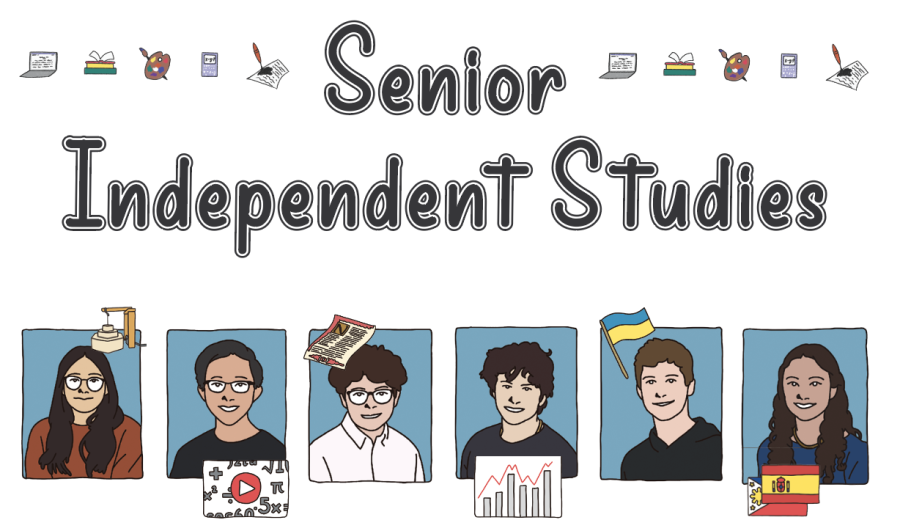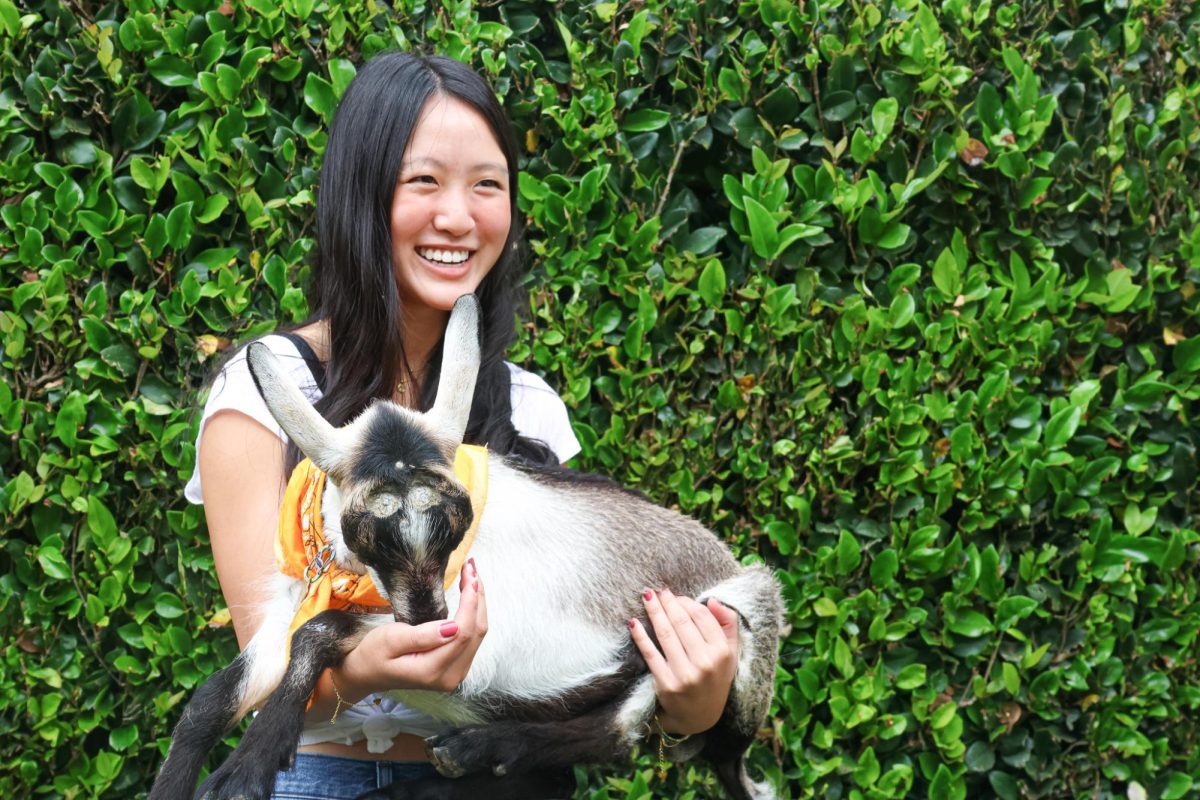Yoshi Kimura
By Zoe Goor
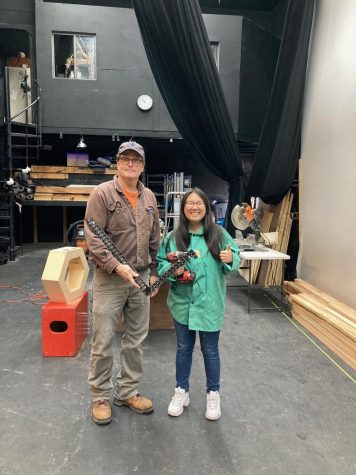
Yoshi Kimura ’23 is building a new instrument and composing a piece of music with it for her Senior Independent Study.
Kimura said the instrument, which is played with a cello bow, is a sound box with nails hammered into it. The nails stick out of the box at different lengths to achieve a range of pitches when the bow is drawn across them.
Kimura said creating a good sound has been challenging for her.
“There’s a lot of unexpected barriers that you come across when building something,” Kimura said. “Sometimes applied designs won’t work out, or we simply don’t have the tools to make things happen, so we have to pivot and retry which can make it a little bit difficult to fit within that first quarter [or] first semester timeframe. I’m a master at making screeches and skirts [on my instrument], but trying to produce a sound [that has] the quality of a violin or guitar is very difficult, especially when your only tools are like wood and nails and scrap pieces of things going around.”
Kimura said she has always wanted to build an instrument, and the Independent Study Program provided her with the carpentry support to finally give it a try. Her faculty mentor, Performing Arts Teacher and Master Carpenter Rees Pugh, said working with Kimura is enjoyable because of her excitement and creativity.
“[Kimura is] just interested in lots of things,” Pugh said. “ She’s inquisitive, which is [a] good starting point for anything. She’s certainly not waiting for me to do it. She’s coming at me every session with a new idea.”
Pugh said he and Kimura have used trial and error to design the instrument.
“We tried and failed at a bunch of different noise-making contraptions,” Pugh said. “At this point, [Kimura] has constructed the main components of an instrument, which are hard to describe. It will be a bow drawn across nails that are knocked in at different lengths to achieve different pitches. So it should play like a string instrument: it’ll be like a wedding cake of nails and the bow will draw across it.”
Kimura said she is happy with the program’s flexibility and accommodation.
“I think Independent Studies really let students pursue what they love, and they build structure into the school day to allow that,” Kimura said.
Kieran Chung
By Olivia So
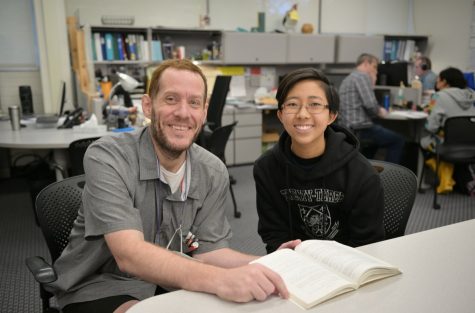
Kieran Chung ’23 is studying set theory, a branch of mathematical logic that deals with collections of objects or elements, for their Senior Independent Study. Chung’s project will culminate in creating YouTube tutorials. Chung said they chose this project to assist other people’s learning and understanding of set theory.
“The idea is to create a conceptual mini lecture series that anybody could watch, even if they don’t have a background in the material and especially if they don’t have time,” Chung said. “A lot of what is out there for higher math levels is an hour to two hours long, and nobody has time for that.”
Chung’s faculty advisor, Mathematics Teacher Joshua Helston, said he is impressed with the speediness and efficiency of Chung’s work.
“I’m surprised with how quickly they have been able to make such high-quality videos,” Helston said. “I created videos back in my previous job, and it took me 10 years to finally get a video system where I could type well to perform things with the videos.”
Helston said he agreed to advise Chung’s project because set theory is fascinating to him.
“We have a field called algebra that abstracts the idea of structure and properties,” Helston said. “Then there’s another field called analysis that abstracts the field of functions, but the field that I studied and that I’m working with Kieran is a field that takes that thought process of abstraction and abstracts that, so you learn this middle level of what it means for something to be true or false,”
Chung said Helston has been a helpful guide throughout the process.
“If I have any questions, I ask him, and he checks in with me to make sure I’m on track,” Chung said.
Helston said the project has been rewarding and that Chung’s math background allows them to have a deepened understanding of mathematics.
“Kieran is doing multivariable calculus right now, which is super applied, and simultaneously, doing super abstract theoretical set theory, so they can see both sides of the coin,” Helston said. “I think in math a lot of times, people only see one side of the coin, and if you learn to love one, that’s fine, but you really should be exposed to both.”
James Hess
By Alden Detmer
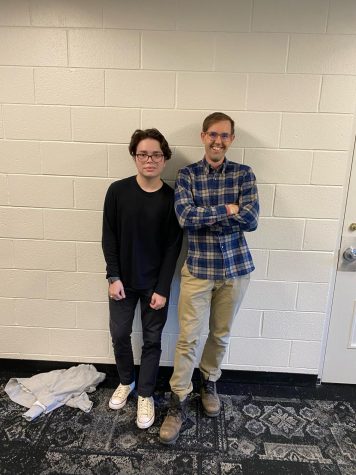
Executive Editor James Hess ’23 is studying Dante Alighieri’s 14th-century epic poem ‘Inferno’ for his Senior Independent Study. Hess, a practicing Catholic, is focusing on the similarities between Dante and contemporary Catholics’ experiences with the Church.
Dante’s Inferno deals with the issues of corruption, bribery and nepotism surrounding the Catholic Church. Hess said some from the 14th century are still at play today.
“I believe in a lot of what the Bible teaches about charity, goodwill and morality,” Hess said. “But, I have a lot of problems, as many others do, with how the Church operates. ‘Inferno’ specifically covers how the Church operates as an institution because, in the medieval and pre-Renaissance period of Italy, the Church was very corrupt.”
Hess said the process of choosing Dante for his project was straightforward.
“I knew from March 2021 that I wanted to do an independent study after [English Teacher Stephen Thompson] had mentioned it,” Hess said. “Having the opportunity to choose something I wanted to read and make a big project out of it sounded amazing. After viewing a proposed list of suggestions, we landed on Dante as a common interest.”
Thompson, who wrote his dissertation on how modern literary criticism is deeply influenced by universities, said his experience with academia has helped him teach Hess important research skills.
“I’m able to tell James that he needs to be strategic about the way that he engages with scholarly material,” Thompson said. “I can easily guide him so he doesn’t have to learn certain lessons the hard way.”
The project includes a complete reading of ‘Inferno’ and a lecture series from Yale professor Giuseppe Mazzotta. It will conclude with a 40-page research paper. Thompson said the skills Hess has been learning from the project will be useful in his future endeavors.
“His project is geared toward understanding how to be a faithful Catholic in a corrupt institution, which I think has universal applicability,” Thompson said. “There’s value in that, but I think even more importantly, James’s project brings together academic and personal interests. There’s actually something at stake, which makes for the best kind of intellectual projects, where it matters beyond merely the library.”
Beau Demaine
By Alex Dinh
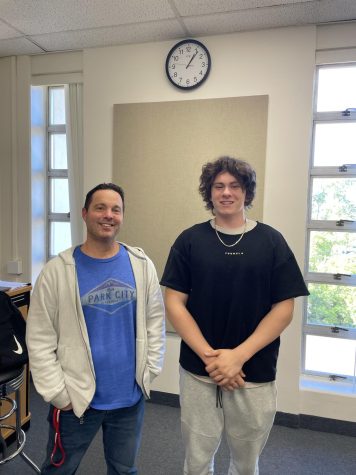
Beau Demaine ’23 is exploring economics for his Senior Independent Study.
Demaine said he decided to take an Independent Study because he wanted to study large-scale and general economics, two topics he was interested in. Demaine is working with his faculty advisor, History Teacher Conrad Cuda, to create activities, readings and writing assignments for his project.
Demaine said the focus of his project is on the global impact and importance of economics.
“My independent study is about the ‘why’ of economics,” Demaine said. “It’s taking a step back from studying modern economic systems, seeing why we do economics as a whole, what it truly is and how much it is impacting society today.”
Demaine said he has found his project novel and exciting.
“A lot of the economic stuff that I’m touching on is kind of controversial and outside the usual realm of what we call economics,” Demaine said. “And a lot of it is relatively new stuff. So I feel like it’s really rewarding to kind of build this up because it’s an ever-evolving project.
Cuda said it has been fulfilling to advise Demaine on his study after seeing his interest in economics grow.
“I was really fortunate that I taught Beau two years in a row, so I had him in 10th and 11th grade,” Cuda said. “My background is a little bit different than some of the other history teachers at school in [that I received] my undergrad degrees in business, and I had a heavy focus in finance and economics. In my history courses, Beau thrived in the concepts that we did for those two years talking about economic development. Given that the project he wanted to do was economics related, it seemed like a pretty natural fit.”
Cuda said working with Demaine has broadened both of their views on economics.
“Beau started sharing resources with me that got me really interested in thinking about economics in ways that I hadn’t before,” Cuda said. “He familiarized me with scholars and academics that I wasn’t familiar with, and I can do the same for him by sharing some of my favorites. We have been trading some of those ideas. And some of those go-to’s in terms of people that we like to lean on in terms of trying to better understand economic concepts.”
Sam Volokh
By Nathan Wang
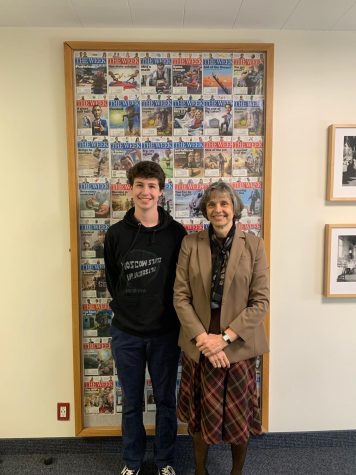
Sam Volokh ’23 is researching and writing a paper on Ukrainian history for his Senior Independent Study.
Volokh said he chose to study Ukraine’s history because of his familial ties to Ukraine.
“My father and his parents immigrated to the United States from Ukraine when he was about seven, so I have a family connection to the country,” Volokh said.
Volokh said as a result of his Ukrainian background, current events regarding the state of Ukraine are important to him.
“I’m concerned about what’s been going on, and I just think it’s really important to take a course that helps you stay up to date on certain issues.”
Volokh said he spent the first quarter of his semester-long project conducting research for his paper.
“It hasn’t been that exciting so far,” Volokh said. “I’ve really just spent a lot of time reading books and articles.”
Volokh said he reached out to Upper School History and Social Studies Teacher Celia Goedde and Upper School English Teacher Sara Cohen to help advise him on his project because of his previous experience working with them, as well as their expertise in their respective fields.
“I actually have two faculty advisors,” Volokh said. “First is my former English teacher Dr. Cohen, whom I wanted to work with because she really helped me throughout the year and made me a much better writer. My second mentor is Dr. Goedde, who is a member of the Independent Study Committee. She has overseen a lot of Independent Studies and knows a lot about history, so she also seemed like an important person to give me suggestions.”
Goedde said she already had a prior interest in Volokh’s research topic, but advising Volokh on his project has kept her up to date on many Ukrainian current events and media.
“I’ve been very interested in Ukraine, certainly, [and] Russia’s antagonism over the past several years,” Goedde said. “I had read some of the historians that I’ve been recommending to Sam just to get a bigger and deeper sense of what’s going on in that part of the world. I was already interested in it, but knowing that I was going to be his advisor made me pay more attention to the articles coming out and other works and authors.”
Chloe Fribourg
By Georgia Grad
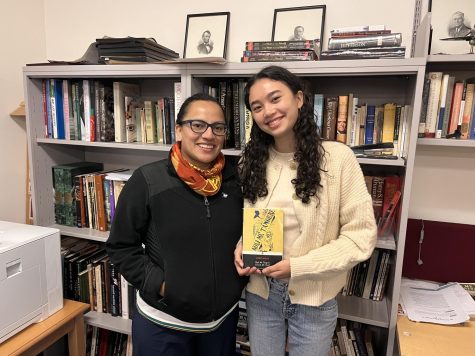
Chloe Fribourg ’23 is studying how the Tagalog language and the Philippines’ Spanish Colonial period impacted each other for her Senior Independent Study.
Fribourg will also look into how the development of Tagalog (a language of the Tagalog people, who make up a quarter of the Filipino population), is connected to the evolution of Filipino culture. She will display her final findings as a printed anthology consisting of self-written essays, Filipino poetry and artwork.
Fribourg said she chose her study topic because language can uncover much about the world.
“Language is something that I really love, and I thought it would be an interesting way to explore my own cultural heritage,” Fribourg said.
She said the most interesting part of her study was discovering the Spanish roots in Tagalog words.
“I learned about the Tagalog word ‘diyos’, or ‘god’ in English,” Fribourg said. “Phonetically, the word ‘diyos’ closely resembles the Latin word for god, or “deus.” This is actually not a coincidence. The Spanish colonists brought Catholicism to the Philippines and would recite the mass in Latin. This one aspect of Latin was quickly absorbed into the Tagalog vocabulary. This is just one instance of Tagalog reflecting its cultural impacts.”
In addition to this discovery, Fribourg said she had a breakthrough reading Jose Rizal’s 1887 novel “Noli Me Tangere.” About a young Filipino man, the book describes Spanish colonization in the Philippines and explains ways the Spanish treated Filipinos poorly.
“I planned on finishing this book in two weeks,” Fribourg said. “This was just impossible. I pushed through, and ultimately feel that I have gained so much from reading an actual primary source. It was all worth it.”
Fribourg’s faculty advisor, Upper School History and Social Studies teacher Ingrid Sierakowski, said she is learning alongside Fribourg while researching.
“We are only mid-semester, but I am already surprised about the interconnections that Chloe has been able to tease out from her reading and exploration of Jose Rizal’s 1887 novel ‘Noli Me Tangere,’” Sierakowski said. “I am absolutely excited to see the end product, in which Chloe has many creative ideas about how to communicate her research and findings.”
Makenna Dovel
By Justine Gustman
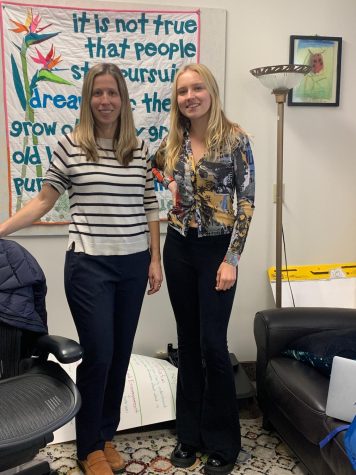
Makenna Dovel ’23 is conducting a study on the self-compassion of students and the psychology behind it for her Senior Independent Study. Self-compassion is the idea of being kind and compassionate towards yourself.
Dovel said she was inspired to conduct the study because she saw studies about the topic of self-compassion.
“Initially I was going to do it on gratitude and how gratitude can help students and then I decided to self-compassion because I had seen so many studies on this,” Dovel said. “This is a new concept on how increasing self-compassion can increase your well-being, productivity and athletic performance.”
Dovel said her study has two different groups, the self-compassion group and the time management group.
“The control group is doing a time management intervention,” Dovel said, “I will be comparing the data for the time management group and the self-compassion group and seeing which one affects the well-being of someone. The self-compassion intervention will be focused on the importance of self-compassion and how one can be more compassionate towards themselves.”
Dovel’s final project will take the form of a video art documentary. Dovel said viewing things visually really helps her understand what is being taught to her.
“I’ve always found directing videos fun and felt videos to be the best medium to get my message across,” Dovel said. “When I was little, my sister and I would use Video Star to make music videos or direct action movies, using the free platform iMovie to spice up the editing. At Harvard-Westlake, I didn’t attempt video art until this year unfortunately, but I wish I had sooner because I love it so much. It reminds me of my childhood and with technology being so important nowadays, I feel like it is very resourceful to know how to put together videos.”
Dovel herself has felt the positive impacts of self-compassion.
“I started the study at a time when I realized how self-critical I was of myself and came to the understanding that being so hard on myself was not beneficial for my success,” Dovel said, “It was making me procrastinate for fear of failure in my work, anxious for the future, and overall miserable. As soon as I started being more self-compassionate towards myself, I noticed instant changes in my mood and anxiety.”
Dovel said Head of Peer Support and Interdisciplinary Studies and Independent Research Teacher Tina McGraw is her faculty sponsor for her senior independent study.
“Dr. McGraw just completed her dissertation so she had just worked on writing a formal paper and researching different studies,” Dovel said, “She was really helpful because she knew what she was talking about. She could guide me in the right direction.”
Mcgraw said that along with the hard work Dovel is putting into her study, she is in the background helping her through it.
“It has been wonderful supporting someone with their first experiment in social science,” McGraw said. “Makenna has learned so much and I hope she is inspired to pursue a social science degree in college and beyond.”
After her study is completed, Dovel will have to analyze all of the data that she has collected. Dovel gave participants a survey on their stress and happiness levels before conducting the study, and sent them the same survey at the end of the study to see if their mindset changed.
Dovel said being more self-compassionate can have positive mental and academic side effects.
“Self-compassion doesn’t make you weaker, or make you less productive, it actually makes you more productive, which is a big point,” Dovel said, “It makes you procrastinate less, which is why I thought was really interesting.”
Dr. McGraw said she believes that self-compassion is a skill that everyone should have.
“Self-compassion is a powerful tool that helps us love and accept ourselves as we are,” McGraw said, “Rejection of our core identities or things about ourselves we can’t change creates a fractured sense of self which damages mental health. Self-compassion overcomes our distress about things that we can’t change that we don’t yet embrace.”
Raisa Effress
By Hannah Shahidi
For her Senior Independent Study, Raisa Effress ’23 is designing, building and photographing a 3D model of a utopian desert home. Effress said she used sketches, research and the software program AudoCAD to develop her model.
The project displays a family of four living in Joshua tree, which Effress said was inspired by her own family. The structure is comprised of seven hexagonal rooms, some depicting communal spaces and others designed for individual people. The designs incorporated the architectural concept poché, where the exterior shape of a building is different from the interior. Effress said Poché was used to symbolize duality and balance in her work.
After being exposed to architectural work by her dad, Effress said she was inspired to learn how to create her own designs.
“I chose to study architecture because I wanted to explore what had previously been an abstract interest in a more formal, dedicated setting,” Effress said. “I’ve helped my dad, who is in the construction business, on AutoCAD projects before, and I have dabbled in architectural drawing and photography, but I have never realized a design of my own. The process has been very fun so far. I feel a lot of freedom to experiment, but there is also the exact right amount of structure to make the project feel manageable and grounded.”
Effress said she has worked with her faculty advisor, Visual Arts Teacher Alexandra Pacheco-Garcia, and professional architects for her project.
“[Pacheco-Garcia] has been incredibly helpful throughout the process, from providing resources and feedback from a visual arts standpoint to connecting me with experienced professionals in the field of architecture,” Effress said. “Alfie Koetter at USC and [Visual Arts Department Head Gustavo Godoy] from the art department have also provided excellent insights.”
Effress said she and Pacheco-Garcia meet during the Directed Study period twice a cycle. Pacheco-Garcia said she helps Effress clarify her ideas and find a direction for her artwork during their meetings.
“At first, she didn’t know what her project was going to be, but through research, she decided that it was going to be an idealized family home,” Pacheco-Garcia said. “That gave her a point of view, a narrative and a story. I can just help her to find her own vision, but really, she’s the one doing the heavy lifting and working hard to take her project where she wants it to go.”
Henry Pokress
By Everett Lakey
Henry Pokress ’23 chose digitally sketching around 12 unisex fashion designs and constructing two for wearable use for his Senior Independent Study.
Pokress said taking costume design electives at school inspired him to do his independent study on fashion design.
“At the upper school, we have a lot more options and we have the costume shop here, so when I was selecting courses in 10th grade I saw that costume design was on there,” Pokress said. “I took the [costume design elective] first, and I took the construction one [elective] after, and I also did the directed study that year. There was no more coursework beyond that, and I knew I wanted to continue doing it. I’m not sure if I’m going to do it professionally, it’s more of a hobby and a creative outlet to me than something I want to do long-term”
Pokress, who described his designs as modern industrial, said he has taken inspiration from older fashion collections and designers like Alexander McQueen for his own work.
“I’m really trying to pull in inspirations from older unisex fashion,” Pokress said. “Inspirations tend to stem from religion, which is really interesting, so I’m kind of pulling some of those sources of inspiration and aligning them. [I’m] having some fun with it too. I don’t want [my collection] to be boring, I don’t want to make anything that you would see at TJ Maxx, I want to make something that you look at it and you’re like ‘Wow, This is something I’ve never seen before,’ Specifically the ones I’m making in person, I want them to have that wow factor.”
Performing Arts teacher Lisa Peters, who is Pokress’ faculty advisor, said she enjoys working with Pokress one-on-one because it allows her to see a new side of his creativity.
“Prior to his Independent Study, the design work I saw from Henry was limited to costume design course assignments, developing believable characters to live in the world of a scripted play,” said Peters. “The work he’s doing for his Independent Study isn’t based on any script and feels less restricted. He’s creating his own story through clothing.”
Peters said that some of the biggest challenges in an independent study are the pacing and workload.
“Henry, like most seniors at HW, caries a rigorous course load and has been devoting a lot of time to the completion of college applications,” Peters said.”Taking on an independent study on top of an already busy schedule requires serious self-discipline and excellent time management.”
Pokress said one challenge he encountered while doing his project was crafting the overall vision of his designs.
“I feel like [Peters] and I have different design styles, and that’s something we’ve had to work through with the study,” Pokress said. “I was always trained by her to use design metaphors, and while that works great for a play, I think for me, when I’m creating ideas that come from my head, it’s harder for her to help me come up with the exact metaphor and look I’m going for. I’ve been making helpful collages [and] writing an artist statement, and so trying to convey what is going on in my head to her at all times has been really important so she can provide me with the best feedback possible.”































